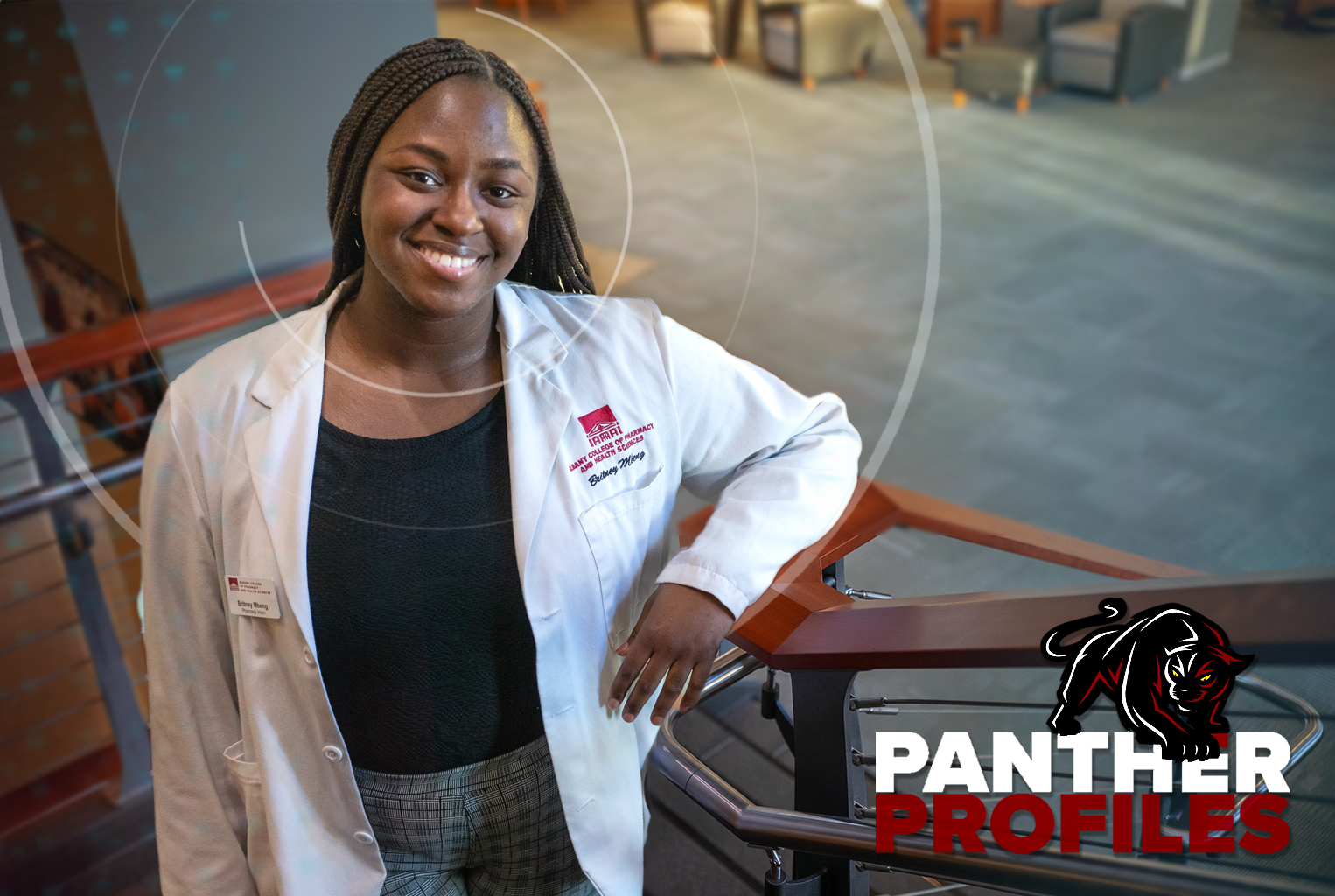
Panther Profiles are Q&A interviews that highlight Panthers of all stripes -- students, faculty, staff, alum, board members and anyone else in the campus community.
Britney Mbeng ’21 holds a bachelor of science in pharmaceutical sciences, with a minor in public health, and is pursuing her doctorate in pharmacy. She grew up in Brazil, then enrolled in the pharmacy program at ACPHS but was unsure if it was right for her. Over the last year, she has discovered she can merge the field with her passion for serving the community and for communicating to help others.
What were your interests before coming to ACPHS?
Growing up, I was a bookworm. I wrote a lot. Everyone always saw me with my head in the books, and that's what I thought I wanted to do. But later, thinking of what I wanted to do in terms of a career, I did not see myself writing books.
You have already earned a bachelor of science in pharmaceutical sciences, and now are getting your doctorate. How did you come to do both?
When I applied to the pharmacy program out of high school, I was not sure that I wanted to do pharmacy, but it was a zero to six (year) doctoral program. I thought that was great, I got to immerse myself in the field quickly. But as I reached the end of my second year, I realized I wasn't going to progress into the doctoral program. With guidance from my advisors and professors, I transferred into the bachelor’s in pharmaceutical sciences program.
During the last year of my bachelor’s degree, I applied back into the pharmacy doctoral program. So ultimately, I'll be here for seven years instead of six, but I gained another degree. I got my bachelor's in 2021 and I will graduate with my doctorate in pharmacy in 2024. And thinking I might stop at the bachelor's degree, I also declared a minor in public health.
How did you come to minor in public health?
I was volunteering at the COVID testing site here on campus. The head faculty member asked me if I wanted to declare a public health minor. I didn't have to take that many more classes, so I did it. It caused me to ask myself how, as a pharmacist or a future pharmacist, can I work in service of my community.
You have advocated for being a public health pharmacist. Tell us about that.
In my opinion, pharmacists already practice public health. They're the most accessible health care providers that we have. You have to schedule a doctor's appointment three months ahead of time, but you can walk into your pharmacy today and talk to your pharmacist. So public health pharmacy to me is just being more intentional with how you work in service of your community.
One of the research projects that I did was about empowering students to practice public health pharmacy: How do we be more intentional with how we advocate for our patients? What questions are we asking patients? For example, can they afford their medications? How did they get to the pharmacy today – did they take a cab, walk, get a bus? It just takes a little bit more work to make sure that your patient has access to their medicines.
Has there been any experience where you have put this idea into practice?
In your third professional year in the pharmacy program, you select rotations for your final year. You put yourself in different fields, whether it’s a pharmacy, hospital or another setting. I knew that I wanted to practice public health pharmacy. And I asked myself, how do I do that?
There was a rotation with the CDC that I had to apply for -- a federal, pharmacy experiential rotation. CDC is a public health entity. And pharmacists, of course, work there.
The rotation that I had was with the CDC in regulatory affairs. In times of a public health emergency, the CDC tries to bring drugs into the U.S. that might not be available here. They have to apply to the FDA, which regulates all drugs on the market in the U.S. And so, I worked on a really interesting application, to bring an antibiotic here from Germany. We had to work really fast.
My supervisors told me: create an infographic for instructions for use for pediatric patients. We don't know anything about the dosing. We don't know its solubility in water -- oftentimes pediatric patients can't swallow a pill, so you have to consider that. And these are public health skills: how can your patient access these medications; how can they take them?
I wasn't expecting to be engaged in anything that made that kind of impact. That was really, really awesome.
It seems like you combined your interests as a pharmacist, public health professional – and a communicator too.
Creating that infographic definitely tapped into my artist’s side. I love creating things from scratch. So that infographic -- I spent hours on it even though I didn't have to, creating all the details. And the fact that I was creating that in the service of other people was really jaw-dropping.
When I used to write poems or short stories, the audience was what mattered. I wanted to change someone's life with my writing. Hopefully I will be able to change someone's life with my infographic, with my knowledge of pharmacy and of public health too. Feeling that I did something that mattered is absolutely insane.

